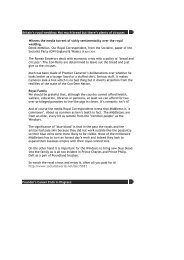The Cape of Good Dope? - Centre for Civil Society - University of ...
The Cape of Good Dope? - Centre for Civil Society - University of ...
The Cape of Good Dope? - Centre for Civil Society - University of ...
Create successful ePaper yourself
Turn your PDF publications into a flip-book with our unique Google optimized e-Paper software.
(Jeppie 1996:15). Parts <strong>of</strong> the rationale <strong>for</strong> this lay in the fact that middle-class youth<br />
were increasingly attracted to crack cocaine. However, while the leadership and<br />
membership <strong>of</strong> Pagad were almost exclusively coloured and Muslim, the movement<br />
soon transcended class divides. This was because as Jeppie puts it, ‘class and locality<br />
do not fit together . . . simplistically . . . the middle class drug consumer market and<br />
gangster activity are connected and overlap. Peddlers . . . are actually the “contracted”<br />
distributors <strong>for</strong> much bigger drug-lords who are gang bosses. Petty crime such as<br />
burglaries and car thefts are <strong>of</strong>ten the result <strong>of</strong> indebtedness to a “merchant” or the<br />
result <strong>of</strong> having to procure substances to satisfy a bad habit’ (Jeppie 1996:14).<br />
Both middle- and working-class people were integrally involved in Pagad. Those I met<br />
while doing fieldwork ranged from flower-sellers and carpenters to owners <strong>of</strong><br />
construction companies and medical doctors. In its early days Pagad’s leadership was<br />
not aligned politically, and included ‘an African National Congress (ANC) branch<br />
executive member, a carpenter and an alarm fitter . . . ‘ (Manjra 1996:40). A critical<br />
commentator on Pagad from its earliest days, Farid Esack, who saw in Pagad the ‘rise<br />
<strong>of</strong> conservative religio-ideological <strong>for</strong>ces seeking to protect the new South Africa from<br />
the “scourge <strong>of</strong> democracy and liberalism”’, noted the ‘myriad <strong>of</strong> seemingly discordant<br />
voices coming from the public Pagad . . . A number <strong>of</strong> strands converge . . . without<br />
any coherent distinction between them, one can simultaneously belong to more than<br />
one stream’ (Esack 1996:24-25). Those streams could range from Africanists alienated<br />
from the PAC to those ‘who believe that the values <strong>of</strong> the liberal democratic state (are)<br />
repugnant to human decency and subversive <strong>of</strong> all religious values and there are those<br />
who believe that there is only one solution <strong>for</strong> South Africa and the world, an<br />
“Islamic” revolution along the lines <strong>of</strong> the Iranian experience. At all <strong>of</strong> these levels, the<br />
discourse is essentially an anti-state one which feeds on deeply felt community<br />
concerns’ (Esack 1996:25).<br />
Women were integrally involved in the Pagad upsurge, ‘aggrieved and angered by the<br />
abuses waged upon them and their families by the men in leather jackets and fast cars<br />
who rule the streets <strong>of</strong> their neighbourhoods’ (Dodd 1996:64). <strong>The</strong> spokesperson <strong>of</strong><br />
Pagad is a housewife, Abieda Roberts, while at the level <strong>of</strong> activity, Pagad member,<br />
Fatima Zahra, points out that in delegations <strong>of</strong> ten who confronted drug merchants,<br />
there were always three or four women. Yet a another woman member, Fasiegha<br />
Arendse, argues that their presence goes unreported by the media because ‘women are<br />
always conveniently written out <strong>of</strong> history <strong>of</strong> these things’ (Quoted in Dodd 1996:67).<br />
S is a Woodstock mother. She became involved with Pagad, by default, when her<br />
brother R, who was involved in the organisation, got arrested. She works at<br />
Independent Newspapers and is not shy or quiet about her Pagad association. This, she<br />
holds, has resulted in her being marginalised in the workplace and she has faced the<br />
effects <strong>of</strong> subtle threats from management. She says, ‘Drug dealers felt safe because<br />
their neighbours didn’t do anything about them. People were cowered into a space <strong>of</strong><br />
apathy. I suppose that’s how I initially reacted until my parents’ home was bombed’.<br />
This happened, S says, because her brother was active in Pagad’s operations and<br />
became a headache <strong>for</strong> the gangsters. Her parents lived in Athlone at the time, and<br />
have since moved to a safer area. S’s brother was 29 at the time, and she says his arrest<br />
followed a shooting at a gangster’s home.<br />
7
















